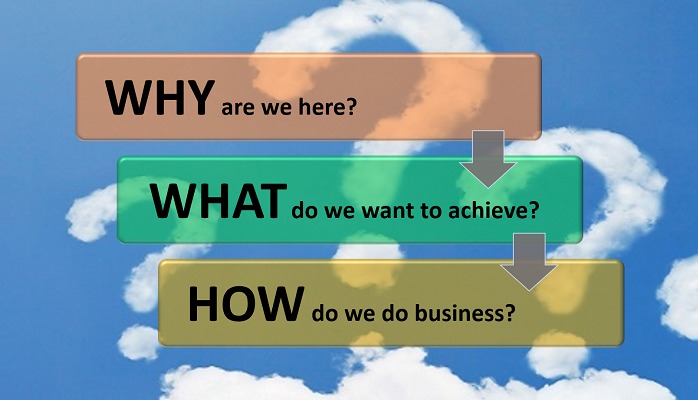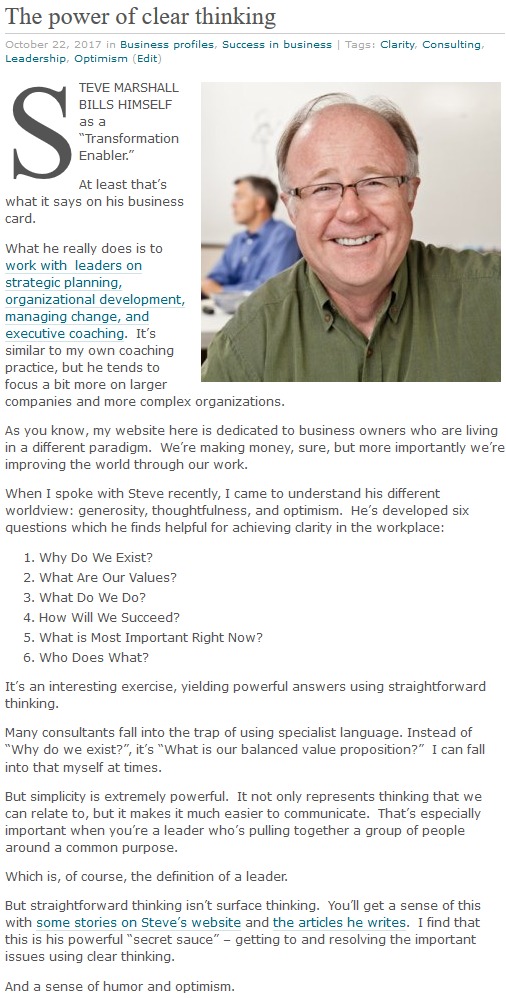By Any Other Name, It is Still the Same!
Note: I have always wondered why we are obsessed with symptoms, instead of causes. This past week's accumulation of events makes me ponder and write. Enjoy! Previous installments of my weekly blog are located on my website at http://stevemarshallassociates.com/steves-blog/
Why Are We Lonely at Work?

Why Are We Lonely in Life?
We're living in what I call an epidemic of loneliness. Recent research has shown that many of the people we feel close to

American culture is so far off the scales in this idea of separation and individuation. It's embedded in our DNA at this point. So at the very get-go, when we're little kids, we get fed into the competitive pipeline, and that gets reinforced—the more and more you do on your own, the better person you are. That becomes the value: "I should be able to do these things on my own."
But then we find a partner and the very skills that would actually allow us to have a good, stable relationship and partnership in life tend to be missing. For some people, they're so competitive that it's hard for them to move into that place of not being domineering, and not being the one who's right. For other people, it's literally just missing the skill set. How does one argue, how do we listen, how do we speak your voice—all of those absolutely essential relational skills get lost in this hyper-intense competition to stand alone at the top of the heap.
Relationship is at the core of human health and well-being, not isolation. Not individuation. Everything grows out of relationships, not away from relationships—we have the model that from when you're born, socialization leads to ever-increasing levels of independence. That central premise just gets us off to the wrong start.
WHO Prediction
The World Health Organization stated on March 30, 2017, that depression (depression is a common mental illness characterized by persistent sadness and a loss of interest in activities that people typically enjoy, accompanied by an inability to carry out daily activities, for 14 days or longer) is the leading cause of ill health and disability worldwide. According to the latest estimates from WHO, more than 300 million people are now living with depression, an increase of more than 18% between 2005 and 2015. Lack of support for people with mental disorders, coupled with a fear of stigma, prevent many from accessing the treatment they need to live healthy, productive lives. By 2025 they predict that figure to increase to 1 in 5 people worldwide will be living with depression.
Here's the Really Bad News
Fewer than 25 percent of people across the world have access to treatments for depression. The World Health Organization recently studied what it calls the “treatment gaps” in mental health care and found that worldwide, the median rate for untreated depression is approximately 50 percent.
The Results?
People with depression typically have several of the following: a loss of energy; a change in appetite; sleeping more or less; anxiety; reduced concentration; indecisiveness; restlessness; feelings of worthlessness, guilt, or hopelessness; and thoughts of self-harm or suicide. As a result, they also become increasingly isolated from other people and develop a profound inability to form relationships.
Ronald Reagan Started the Ball Rolling
Really? What did he do? Let all of the mentally ill patients loose? Well, yes, that’s precisely what he did.

In 1963, President John F. Kennedy signed the Community Mental Health Act to provide federal funding for the construction of community-based preventive care and treatment facilities. By 1977, there were over 650 community health facilities in the US serving over 1.9 million mnetally ill patients a year.
When Reagan was elected President in 1980, he discarded a law proposed by his predecessor, Jimmy Carter, that would have continued funding these same federal community mental health centers. This basically eliminated services for people struggling with mental illness. Federal mental health spending decreased by 30%. More than one million patients were released as a result of this legislation. Some were taken in by nursing homes, many became institutionalized in prisons, and the rest became homeless.
He made similar decisions while he was the governor of California, releasing more than half of the state’s mental hospital patients and passing a law that abolished involuntary hospitalization of people struggling with mental illness. This started a national trend of de-institutionalization. In other words, if someone is struggling with mental illness, they can only be helped if they ask for it. But, wait. Isn’t one of the characteristics of severe mental illness not having an accurate sense of reality? Doesn’t that mean a person may not even realize he or she is mentally ill?
Here's My Point

Taking a theme from my strategic planning playbook, we in America have a hard time distinguishing between the critical hierarchy of Why, What, and How. As a rule, we default to the how because that's most comfortable and we are good at it - just go to YouTube, and you can easily find out how to do anything from fixing your lawnmower to making a perfect chocolate cake.
Last weekend, yet another human being took it upon himself to eliminate other humans violently and horrifyingly. Did he

* Dave Crenshaw is the master of building productive leaders. He has appeared in Time magazine, USA Today, FastCompany, and the BBC News. He has written three books and counting, including The Myth of Multitasking which was published in six languages and is a time management bestseller.
Articles from Steven Marshall
View blog
Note: I have heard the title of this blog numerous times when I tell people what I like to do for fu ...

Note: I recently met a gentleman named Carl Dierschow, who owns/runs a consulting company called "Sm ...

NOTE: This is my latest observation on cultural life in America. It is in severe decline. It is prim ...
You may be interested in these jobs
-
Travel Ultrasound Technologist
Found in: beBee S2 US - 3 weeks ago
LeaderStat Burlington, United States FreelanceLeaderStat is seeking a travel Ultrasound Technologist for a travel job in Burlington, Massachusetts. · Job Description & RequirementsSpecialty: Ultrasound Technologist · Discipline: Allied Health Professional · Start Date: 04/08/2024 · Duration: 13 weeks · 40 hours per week · Sh ...
-
Veterinary Technician Instructor| Part-Time
Found in: Lensa US P 2 C2 - 4 days ago
Pima Medical Institute Tucson, United States Part timeESSENTIAL FUNCTIONSImplement and evaluate daily lesson plans for students to include scheduled activities and materials of modules.Plan instruction to achieve specific objectives based upon student need and established curriculum.Monitor the attendance of students in the program ...
-

Intern
Found in: Appcast US C2 - 17 hours ago
Flex-N-Gate Corporation Detroit, United StatesFlex-N-Gate is a leading manufacturer and supplier of components for the automotive industry, recently ranked 10th of the 150 Top North American Suppliers in "Automotive News." A growing and vital company, Flex-N-Gate provides a great opportunity for hard-working and skilled indi ...


Comments